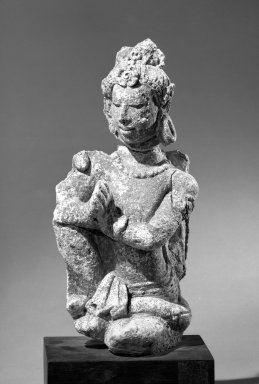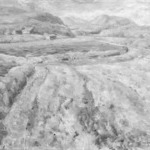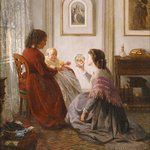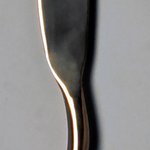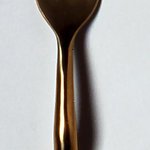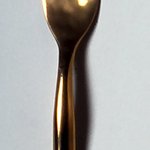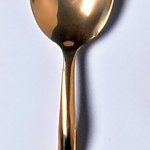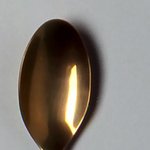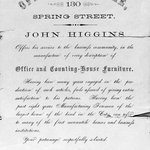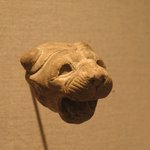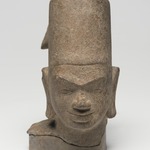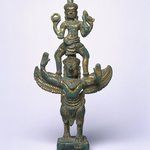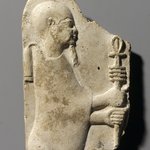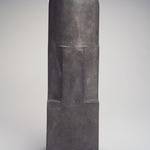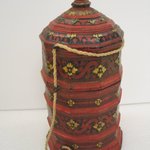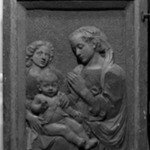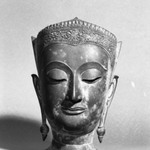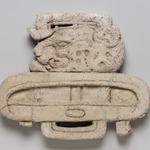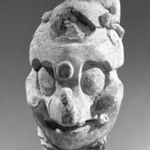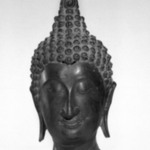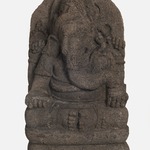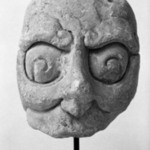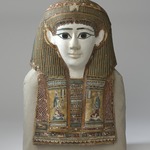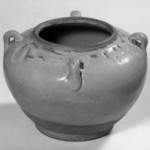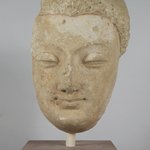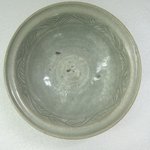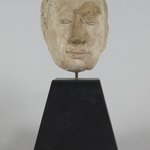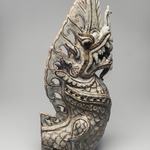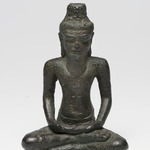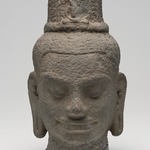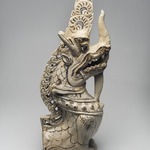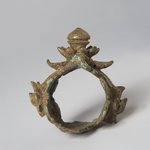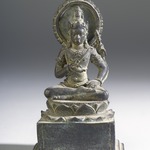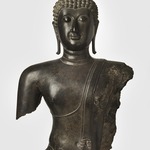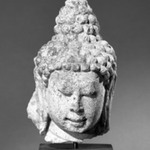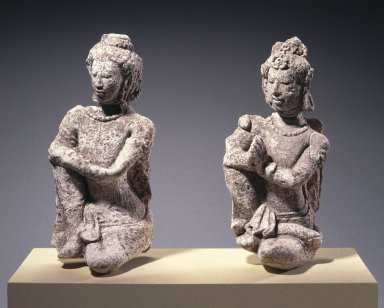
Kneeling Praying Figure
Asian Art
On View: Asian Galleries, North, 2nd floor (Japan)
These stucco carvings from Nakon Pratom show the naturalism achieved in early Thai Buddhist temple decoration.
MEDIUM
Stucco
DATES
ca. 7th–8th century
PERIOD
Dvaravati Period
DIMENSIONS
11 x 5 1/4 x 4 in. (27.9 x 13.3 x 10.2 cm) (show scale)



COLLECTIONS
Asian Art
ACCESSION NUMBER
86.227.161
CREDIT LINE
Gift of the Ernest Erickson Foundation, Inc.
CATALOGUE DESCRIPTION
Two stucco figurines in high relief. Both figures were originally part of a frieze, perhaps even the same one. Their postures are the same, i.e., each faces to his right presenting a three-quarters profile, and sits with body resting on the left leg which folds under it while the right leg is drawn up with its foot adjacent to the folded left leg and serves as a support for the right elbow. The hands of one of the figures (figure A) still remain and are joined as if in supplication. Figure B's hands are missing but the position of the arms is the same as in Figure A.
The jewelry in figure A is more apparent, showing a necklace, upper armbands on the left arm and bracelet on the left wrist. The same can be seen to have existed on figure B but are not as clearly preserved. Both figures wear the same type of skirt, or dhoti, looped around the waist with the flap or fold of cloth pendant between the legs. Again, these details are more clearly preserved in figure A which is as well more attenuated and more delicately modeled than figure B. Figure A has been broken at the shoulder and repaired, but the repair is poor. The heads of both figures may not have existed originally on the bodies they now complete. Possibly the heads should be reversed on the figures. (This will be done at the Museum at the request of Mr. Erickson and with the permission of the dealer.) The head of figure A shows a more detailed headdress and head ornaments with a large round earring worn in the left ear. Figure B's head shows the remains of snail shell curls and possibly an ushnisha. The long earlobe on the left wears no earring. Both heads had been broken off their bodies and then replaced, possibly incorrectly. The faces particularly although in seated pose, is comparable to the stucco fragment in the Pathama (see ill. Theodore Bowie, ed., "The Arts of Thailand"< Indiana University Press, Bloomington, 1960, Figure 30, p. 65, cat # 28.)
MUSEUM LOCATION
This item is on view in Asian Galleries, North, 2nd floor (Japan)
CAPTION
Kneeling Praying Figure, ca. 7th–8th century. Stucco, 11 x 5 1/4 x 4 in. (27.9 x 13.3 x 10.2 cm). Brooklyn Museum, Gift of the Ernest Erickson Foundation, Inc., 86.227.161. Creative Commons-BY (Photo: , 86.227.161_86.227.162_SL1.jpg)
IMAGE
group, 86.227.161_86.227.162_SL1.jpg.
"CUR" at the beginning of an image file name means that the image was created by a curatorial staff member. These study images may be digital point-and-shoot photographs, when we don\'t yet have high-quality studio photography, or they may be scans of older negatives, slides, or photographic prints, providing historical documentation of the object.
RIGHTS STATEMENT
Creative Commons-BY
You may download and use Brooklyn Museum images of this three-dimensional work in accordance with a Creative Commons license. Fair use, as understood under the United States Copyright Act, may also apply.
Please include caption information from this page and credit the Brooklyn Museum. If you need a high resolution file, please fill out our online application form (charges apply).
For further information about copyright, we recommend resources at the United States Library of Congress, Cornell University, Copyright and Cultural Institutions: Guidelines for U.S. Libraries, Archives, and Museums, and Copyright Watch.
For more information about the Museum's rights project, including how rights types are assigned, please see our blog posts on copyright.
If you have any information regarding this work and rights to it, please contact copyright@brooklynmuseum.org.
RECORD COMPLETENESS
Not every record you will find here is complete. More information is available for some works than for others, and some entries have been updated more recently. Records are frequently reviewed and revised, and we welcome any additional information you might have.
